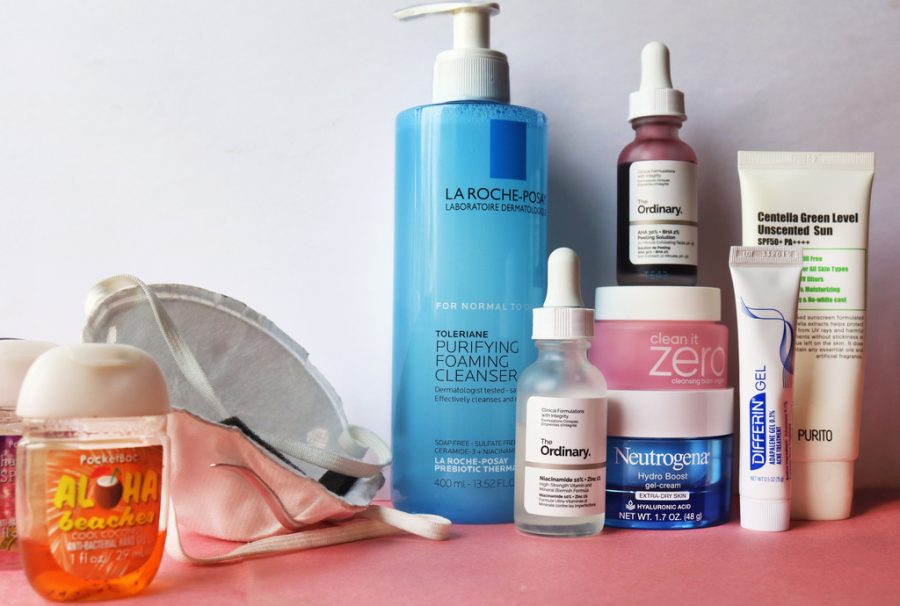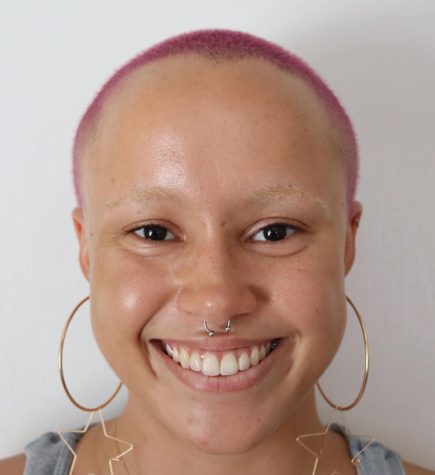Lockdown skin care
Skin care can seem like an afterthought during times of civil unrest, a looming virus and one of the worst recessions since the Great Depression. But according to Dr. Zion Ko Lamm and Dr. Renée Beach, it is still important to practice a skin care routine as simple as cleanse, moisturize and protect.
According to a survey of 2,000 Americans about their skin care habits, 55% of the respondents admitted to not washing their face daily. Of the respondents who do wash their face, 48% have never used a cleanser, 47% have used shampoo or conditioner and 41% have used hand soap. Although these might seem like trivial offenses, dermatologists such as Dr. Renée Beach, and Dr. Zion Ko Lamm begged to differ.
According to her website, Beach earned her medical degree from McMaster University and completed her dermatology residency at the University of Ottawa. Currently located in Toronto, Canada, she practices in both medical and cosmetic dermatology with specialties in acne prevention, eczema prevention, skin cancer management and more. Besides being a dermatologist based in Charlottesville, North Carolina, Lamm is board-certified in internal medicine, with a specialty in the prevention, diagnosis and treatment of internal diseases. She also has a knack for Korean skin care, nutrition and holistic preventive wellness.
Why is it essential to still keep a regular skin care routine during such unsettling times?
Lamm: This year has been rough for all of us. During the times of uncertainty, loneliness and sadness, it is important to self-care and self-love. I also want to point out that during these stressful times, due to hormonal imbalances, you can experience breakouts and skin care issues you’ve never had before. Instead of dealing with the aftermath of acne, hyperpigmentation and wrinkles, my goal is to prevent them and treat them head-on.
What are the biggest mistakes people make when it comes to skin care?
Beach: There are a few — lack of consistency and patience are two factors for sure. People expect results after one week when that’s just not how skin care products work. Also, picking of the skin — a huge no-no that can keep acne blemishes around longer, or even cause scarring depending on the depth of skin reached.
What is the most basic, but necessary, skin care routine you’d recommend?
Beach: I recommend a gentle cleanser. Ideally one that is fragrance free, water based and tolerable throughout all seasons. Sunscreen with at least SPF 30 is a must. It helps to protect against burns. From an aesthetic perspective, it prevents discrepancy in skin tones between sun-exposed and sun-shaded areas or sun freckles, which are also known as lentigines. Also, preferably something that helps boost protection of the skin, like serum containing antioxidants such as vitamin C, ferulic acid or tocopherol or hydrating plumping agents such as sodium hyaluronate or glycerin.
When shopping for products, what are ingredients to avoid? Also, does expensive or trendy mean it’s better?
Beach: There are no definite rules, but skin irritation can occur from products with fragrance/ parfum or certain botanical plant extracts. I see it regularly. Also, there is no major correlation between expense and quality. Some expensive brands have more impactful media campaigns or more stunning packaging.
According to an ingredient dictionary on Paula’s Choice Skin Care’s website, a few botanical plant extracts that can cause skin irritation or sensitivity are angelica archangelica root oil, balsam peru, bergamot oil and citrus medica limonum. The extracts are also commonly used as fragrance in skin care products. Fortunately, websites such as SkinCarisma.com are available when you find a product with unfamiliar ingredients. The site generates an analysis of the ingredients inputted, giving each ingredient’s cosmetic function along with its potential effects, such as fungal acne trigger, anti-aging, acne-fighting and ultraviolet protection.
Is it necessary to wash your face in the morning and at night even if we’re not outside as much?
Lamm: Regardless of leaving the house or staying home, you are still prone to debris and impurities building up on your skin throughout the day. It is super important to cleanse your face day and night. I can’t stress this enough!
What about sunscreen? Do we have to use it even when we are mostly inside?
Lamm: Most windows do not block ultraviolet rays that can penetrate the skin deeper and cause premature aging of the skin, or photoaging, caused by repeated exposure to ultraviolet radiation. Even if you are indoors, I often recommend sunscreen. Given our obsession with tan skin, I often tell my patients to use sunscreen and tanning lotion such as L’Oreal Sublime Bronze Hydrating Self-Tanning Milk ($13) or Fake Bake Flawless Self-Tan Liquid ($28) for the glow. Skin tone should not play a role regarding how much and how often to use sunscreen. Darker skin tones are still susceptible to as much damage as the rest.
Sunscreens are separated into two categories: mineral or chemical. According to CeraVe.com, mineral sunscreen contains ingredients such as zinc oxide and titanium dioxide, which form a barrier on the surface of the skin that helps reflect UV rays. Chemical sunscreen contains ingredients such as oxybenzone, avobenzone, octisalate, octocrylene, homosalate and octinoxate, which penetrate the top layers of the skin to absorb UV rays. Besides the difference in ingredients, the two vary in consistency when applying to the skin. Mineral sunscreens tend to be tacky and harder to blend into the skin, which leave a white cast. Chemical sunscreens have an easier application since the ingredients in them tend to soak into the skin.
Lastly, besides products, what are other things people can do during quarantine to help keep their skin healthy?
Beach: It sounds simple, but keep your hands off of your face and sleep. Hands off the face is key because whatever we touch, if we then touch our face, we’re reintroducing residues, bacteria, etc. back onto our face and close to our mucus membranes. Sleep is critical because it allows our body to repair. You can put all the latest serums and products on the skin, but if it can’t rest and repair they won’t have the best impact.
My skin care checklist based on what I learned:
Cleanse
- CeraVe Hydrating Facial Cleanser for Normal to Dry Skin ($15)
- CeraVe Foaming Facial Cleanser for Normal to Oily Skin ($14)
- La Roche-Posay Toleriane Purifying Facial Cleanser for Normal to Oily Skin, ($15)
- La Roche-Posay Toleriane Hydrating Gentle Facial Cleanser ($15),
- Neutrogena Ultra Gentle Hydrating Daily Facial Cleanser for Sensitive Skin ($8),
Moisturize
- Vanicream Daily Facial Moisturizer for Sensitive Skin ($14)
- CeraVe Daily Moisturizing Lotion for Normal to Dry Skin ($12)
- La Roche-Posay Toleriane Double Repair Moisturizer with SPF 30 ($20),
- Neutrogena Oil-Free Facial Moisturizer for Sensitive Skin ($10)
Serums
- Vitamin C Serum by L’Oreal Paris ($16)
- The Ordinary Buffet, sodium hyaluronate, glycerin ($15)
- Maelove The Glow Maker Antioxidant Serum, vitamins C, E, ferulic acid, hyaluronic acid, glycerin, tocopherol and sodium hyaluronate ($28)
- Neutrogena Hydro Boost Hyaluronic Acid Serum, sodium hyaluronate, glycerin
Protect
- Vanicream Sunscreen Sport SPF 35 ($15)
- PURITO Centella Green Level Safe Sun SPF50+ PA++++ ($16)
- Eucerin Daily Protection Face Lotion with SPF 30 for Sensitive Skin ($8)
- Neutrogena Clear Face Liquid Lotion Sunscreen for Acne-Prone Skin, Broad Spectrum SPF 55 ($11)
- Neutrogena Oil-Free Daily Long Lasting Facial Moisturizer with SPF 35 ($7)
- Vichy Ideal Capital Soleil Ultra Light Face Sunscreen SPF 50 with Antioxidants ($25)



